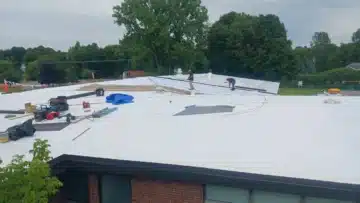Choosing the right commercial roofer in Vermont can be a daunting task. With so many options available, it’s essential to know what to look for to ensure that you make the best decision for your business. In this blog, we’ll explore key tips that will guide you through the selection process, ensuring you find a qualified and reliable roofing contractor.
1. Assess Your Roofing Needs
Understanding the specific requirements of your roof is the first step. Consider factors such as the roof type, size, and any unique challenges it may present. Not all roofs are created equal, and what works for one structure might not suit another.
Do you have a flat roof, a sloped one, or something more complex? Each type has its own set of needs. Additionally, think about the climate in Vermont; heavy snow and rain can impact the kind of materials and techniques that are necessary. Being clear about your needs will help you convey your expectations to potential roofers.
2. Gather Recommendations
Ask other business owners or friends in your area for referrals to reputable roofing contractors. Personal experiences can provide valuable insights, giving you a head start in finding someone trustworthy.
It can also be beneficial to look online for local business directories, as these can offer a wealth of information. Recommendations often come with candid reviews of the roofers’ work ethics, punctuality, and overall satisfaction. Make a list of potential candidates based on these recommendations, and don’t hesitate to reach out to them!
3. Check for Licensing and Insurance
Always verify that your commercial roofer has the necessary licenses and insurance. This protects you from liability and ensures compliance with local regulations. A licensed contractor is not only more trustworthy but also legally obligated to meet certain standards.
In addition to licenses, consider requesting proof of insurance. A roofer with adequate insurance coverage protects both themselves and you from unforeseen incidents during the project. This due diligence may take some time but can save you a lot of trouble down the line.
4. Review Past Projects
Request case studies or examples of previous work. Evaluating their portfolio helps you gauge their expertise and craftsmanship. Many reputable roofing contractors will have a section on their website showcasing their past projects.
Pay attention to the variety of projects they’ve handled. This can demonstrate their capability to tackle different roofing systems and types. If possible, visit some of these completed projects in person. Observing their work firsthand can provide you with deeper insight into the quality and reliability of their craftsmanship.
5. Read Reviews and Testimonials
Online reviews can provide insight into customer satisfaction and the roofer’s reliability. Look for patterns in feedback to help inform your decision. Testimonials highlighting positive experiences can instill confidence in your choice.
However, don’t just focus on the glowing reviews. Pay attention to any concerns raised in the negative reviews and see how the contractor responded. This reveals a lot about their customer service and willingness to address issues, which is essential in a contractor.
6. Ask About Materials and Techniques
Inquire about the materials they use and their roofing techniques. A quality contractor should be knowledgeable about the best options for your specific needs. This not only helps you understand what to expect but also shows the roofer’s commitment to sustainable and reliable practices.
Discussing materials upfront can also open the conversation about potential cost differences. High-quality materials may initially seem more expensive but can save you money in the long run through durability and lower maintenance.
7. Request Detailed Estimates
Obtain written estimates that outline the costs and scope of work. This ensures clarity and helps you compare different roofers effectively. A detailed estimate should break down labor, materials, and any additional costs, giving you a comprehensive view of what you’re getting into.
Warning bells should go off if a roofer provides vague or incomplete estimates. Transparency is key in the contracting business. By gathering several estimates, you can ensure that you’re comparing apples to apples, making it easier to choose the best option.
8. Discuss Warranty Options
Understand the warranties offered on both materials and workmanship. A solid warranty is a sign of a contractor’s confidence in their work. This can provide you peace of mind, knowing that if something goes wrong after the job is done, you are covered.
Be sure to ask how long the warranties last and what they specifically cover. Are they pro-rated? Do they come with exclusions? Clarity around warranty details can prevent nasty surprises later on.
9. Establish Clear Communication
Choose a roofer who communicates openly and promptly. Good communication is essential for a successful project and fosters trust. From your initial conversations, you should feel comfortable asking questions and expressing your concerns.
Consider how responsive they are during your preliminary discussions. If they take days to reply to your emails or messages, it might raise concerns about how they’ll handle communication throughout the project. A good roofer will keep you updated from start to finish.
10. Plan for a Timeline
Discuss the expected timeline for the project and any potential delays. A reliable roofer will provide a realistic schedule that includes milestones along the way.
Keep in mind that unforeseen circumstances can arise, especially in Vermont’s variable weather. It’s crucial to have a flexible approach while ensuring that your contractor is committed to keeping you informed about any changes to the timeline.



